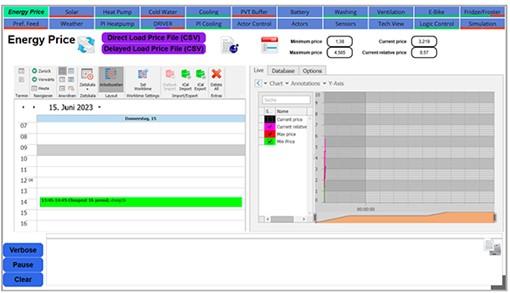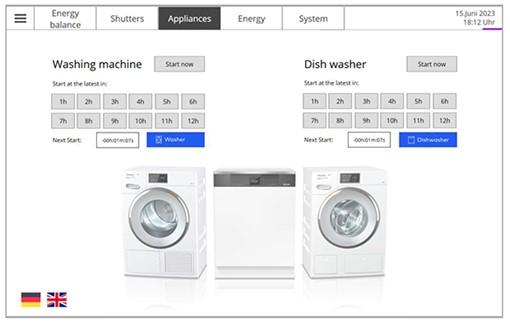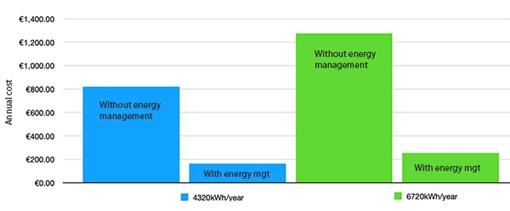27. Sep 2023
KNX Hackathon Finalist: - EisBaer Software PV Manager and KNX Reduce Household Energy Costs by 80%

Rene Rieck explains that by ensuring appliances are operated at times which are both environmentally and economically favourable, typical annual electricity costs can be reduced by 80%.
LOCAL+ is an initiative involving architectural students from Aachen University of Applied Sciences. Its design challenge was to develop a building that produces excess energy through innovative and forward-looking systems: a so-called plus-energy house that is almost self-sufficient.
The team designed a building that has communal cooking, laundry and garden facilities, as well as four floors, each housing up to three residents. Each resident has their own movable private unit, called a CUBE, that includes a fold-up bed, wardrobe and desk. A demonstration building, comprising the communal cooking and laundry space, plus one living floor, can be visited in Wuppertal, Germany.
Self-sufficiency
Image - energy prices - The EisBaer Software PV Manager is an advanced energy management system designed to optimise the use of solar power and efficiently manage household or industrial appliances based on energy forecasts and price fluctuations.
To start with, a central hydrogen system, interacting with other components, was specified as the main source of energy, promising up to 65% self-sufficiency. Other components include an underground ice store, PVT collectors and a heat pump. In practice, the hydrogen system was dispensed with due to a short service life, and the ice storage facility was reduced in size due to underground construction constraints.
Apart from these site-related limitations, the system was implemented in line with the plans and uses KNX devices connected via KNX IP Secure to the EisBaer Software PV Manager. In this project, EisBaer software provides the overall control solution for all of the services, including the HVAC, water temperature and energy management.
To generate electricity, PVT modules were installed on the roof and south-west facade of the building, with an output of 18.5kWp and 9kWp respectively. The electricity produced is delivered directly to the mains system during the day, on demand, with excess being stored in a battery for use during the night. Excess energy is also used to run home appliances during the day.
Using data to save energy
During the commissioning stage, users input crucial information, including characteristics of the photovoltaic (PV) modules, such as their orientation and peak power output. One of the key features of the PV Manager is its ability to integrate real-time energy price data, which can be uploaded to the system with a granularity as fine as 15 minutes. This dynamic pricing data empowers the PV Manager to make informed decisions based on the interplay between solar generation and energy costs to determine the optimal scheduling of various appliances and devices, according to their energy consumption requirements and user preferences.
Image - appliance control - The EisBaer Software PV Manager allows users to retain the ability to interact with the system, either through direct instructions or preferences.
Users have the
flexibility to instruct the system to prioritise using the cheapest energy
grid, maximise solar power usage, or find a balance between the two. For
instance, if an appliance, such as a heat pump, has a minimum required runtime,
this constraint is factored into the scheduling process. Additionally, the
software can divide the energy load into morning and afternoon segments, much
like a battery storage system, allowing for optimised energy usage across the
day.
Users always retain the ability to interact with the system, either through direct instructions or preferences. For example, a user might prompt the system to begin the washing cycle within a specific timeframe. The PV Manager would then evaluate solar generation patterns and energy prices to identify the most optimal time to initiate the task. In cases where immediate action is required, users can request to start an appliance 'now'. The system then promptly restructures the existing schedule to accommodate this request while still considering solar availability and energy costs.
Example savings
The following gives an example of the savings that can be made by implementing energy management and optimising appliance usage.
Scenario 1: Without Energy Management
Total annual cost without energy management:
For 4320kWh/year: 4320kWh x €0.19/kWh = €820.80.
For 6720kWh/year: 6720kWh x €0.19/kWh = €1276.80.
Image - Graph comparing annual costs, without and with energy management, for a household with a power consumption of 4320kWh/year and 6720kWh/year.
Scenario 2: With Energy Management
Using the EisBaer Software PV Manager to schedule the washing machine and dishwasher during times of high solar generation and periods when the energy prices are 20% lower, the savings and costs are as follows:
Savings per day: €0.19/kWh x 0.20 = €0.038/kWh.
For 4320kWh/year: €0.038/kWh x 4320kWh = €164.16
For 6720kWh/year: €0.038/kWh x 6720kWh = €255.36
Total Savings with Energy Management:
For 4320kWh/year: €820.80 (Without Energy Management) - €164.16 (With Energy Management) = €656.64.
For 6720kWh/year: €1276.80 (Without Energy Management) - €255.36 (With Energy Management) = €1021.44.
By implementing energy management and optimising appliance usage, the household could potentially save between €656.64 and €1021.44 annually, depending on its energy consumption within the given range, at an energy price of 19 Euro cents per kWh. This equates to an annual saving of around 80%.
Consclusion
This project demonstrates that significant savings can be made using KNX automation combined with energy management software such as the EisBaer Software PV Manager. By intelligently analysing solar forecasts and energy pricing data, and factoring in user preferences and constraints, this type of system ensures that appliances are operated at times that are both environmentally and economically favourable. It not only promotes energy independence and sustainability, but also empowers users with real-time control and insights into their energy consumption patterns.
Rene Rieck is Global Product Manager for Alexander Maier GmbH, maker of EisBaer energy management and visualisation software.
Highlights
-
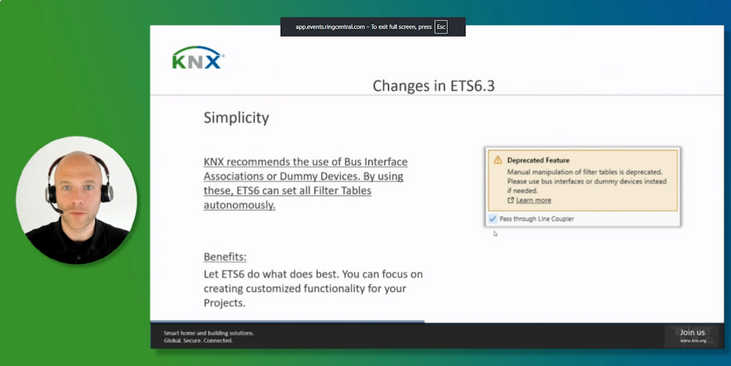 Press
PressETS6 Roadshow 2025 marks global success, showcases power of ETS6.3
ETS6 takes center stage during the month of May with 24 roadshow stops all over the world. -
 News
NewsThe KNX Journal 2025 is now available
The latest edition of our annual smart home and building solutions magazine has arrived. The KNX Journal 2025 offers ... -
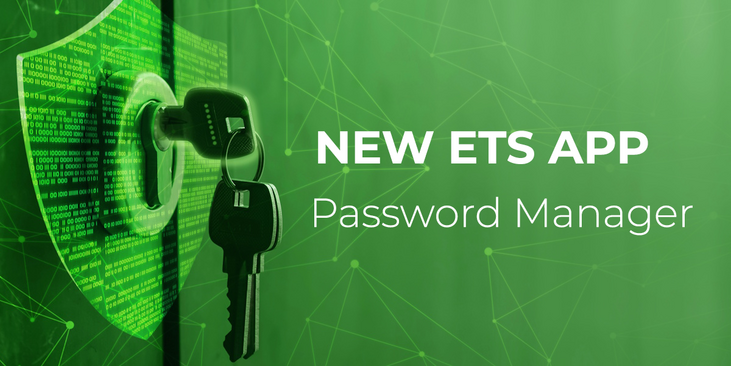 News
NewsNew ETS App: Password Manager
The ETS Password Manager is a powerful new ETS App introduced in ETS 6.3 that eliminates the need to repeatedly enter ...

